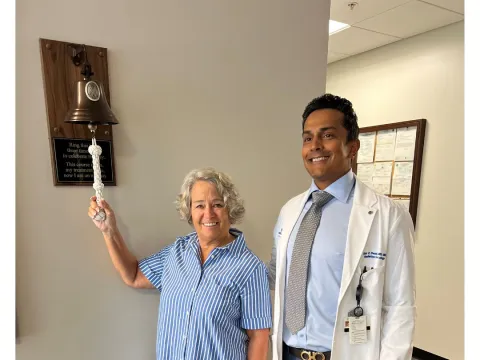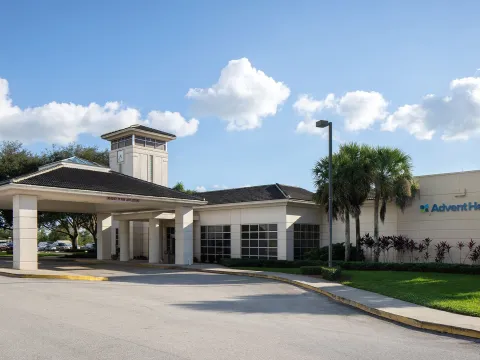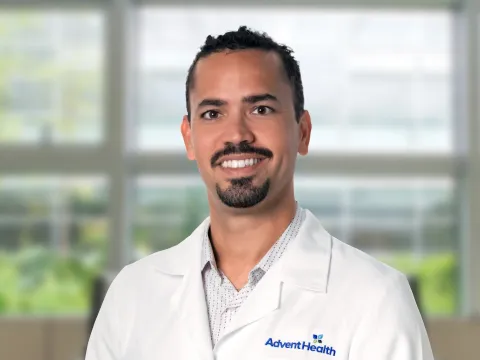- Lauren Williams

In the world of medicine, time can be the ultimate enemy. When it comes to sepsis -- a life-threatening condition that often spirals into fatal septic shock -- every second counts.
For many, sepsis is already well underway by the time it is diagnosed. If detected late, septic shock can set in, increasing a patient's mortality rate by 7 percent with each passing hour.
With mortality rates for septic shock ranging between 30 to 40 percent, diagnosing and treating it early can mean the difference between life and death.
"As you start to catch it earlier, you can investigate it earlier. All that starts with early intervention."
Unlike a traumatic injury, such as a broken bone, sepsis is not as easily spotted when a patient arrives at an emergency department. But a first-of-its-kind sepsis dashboard at AdventHealth has taken detection to a new level, placing the hospital system in the top decile for quality sepsis care in the U.S.
"No one wears 'sepsis' across their forehead when they walk in," said Daniel Peach, AdventHealth's executive director of clinical innovation. "From a pathophysiological approach, there's a chemical cascade that happens. As you start to catch it earlier, you can investigate it earlier. All that starts with early intervention."
Instead of relying on months-old, pre-filtered data from past sepsis cases, AdventHealth's clinical innovation teams developed the dashboard to serve as a real-time tool to help clinicians earlier identify the necessary practice changes to improve survival rates among sepsis patients.
AdventHealth has treated almost 149,000 sepsis patients across the country since the dashboard was launched in 2022.
The results speak for themselves: Mortality rates have been halved, and the average length of stay has decreased by a full day for each patient.

Sepsis can be triggered by any infection in the body, including from a urinary tract infection, pneumonia or an abdominal issue. If the infection spreads or releases toxins into the bloodstream, the immune system overreacts, causing widespread inflammation.
During septic shock, blood pressure drops dangerously low, increasing the risk of organ failure.
Sepsis is typically treated using antibiotics, fluids or blood pressure-supporting medications to provide the body ample care and ensure that the immune system does not further weaken, which could cause additional complications.
The sepsis dashboard provides valuable data, including patient demographics and details about each patient's individualized care journey.
When did the infection occur? When were the antibiotics administered? Which protocol was the most effective? The dashboard answers those questions and more, complete with a traffic-light system that visually flags patients' potential for sepsis and a health equity landing page to give clinicians a comprehensive view that informs their care.
But the dashboard is more than a tool used for tracking outcomes -- it's a catalyst for change, promoting thoughtful, patient-centered care. It enables AdventHealth's more than 50 hospitals to compare their performance with one another while also adopting best practices.
Trained sepsis coordinators are also placed on these teams to analyze the data.
"It's a very active approach," Peach said. "We have weekly meetings with our medical staff where we start to define where areas are going wrong. It becomes a cycle of continuous improvement, enhancing the cultural change from within."
The dashboard's success has sparked further innovation, with teams now exploring how similar dashboards could be implemented for other conditions, such as chest pain and pneumonia.
"Sepsis is systematic -- it's smoke and fire," Peach said. "As a clinician, you have two choices: You could either remain silent and see if a fire starts, or you can tell people you smell smoke. It might be someone's burnt toast, but pulling the alarm could save everyone's life."
Recent News

AdventHealth named among U.S. News & World Report’s fifth annual 2026 Best Hospitals for Maternity Care
This marks the third year in a row AdventHealth Shawnee Mission has appeared on the U.S. News & World Report’s list of Best Hospitals for Maternity Care.

AdventHealth Waterman strengthens access to expert specialty care with expansion of Mount Dora medical plaza
Second floor buildout adds orthopedics, sports medicine, women’s health and heart care for Lake County

Expanding hope through innovation: AdventHealth advances cancer care across East Florida
Cancer touches nearly every family, and in Flagler, Lake and Volusia counties, the demand for timely, advanced care keeps rising. AdventHealth’s East Florida Division, which includes seven hospitals...

A new chapter begins: AdventHealth Avista opens its on-campus surgery center
This milestone marks a meaningful new chapter for a team whose history stretches back more than two decades.

AdventHealth Porter Performs Rare, Complex Robotic Kidney Cancer Surgery
AdventHealth Porter has reached an extraordinary milestone in surgical innovation, completing what is believed to be the first robotic left radical nephrectomy with inferior vena cava (IVC)...

Amanda Robinson, DO, joins AdventHealth Medical Group Family Medicine, Internal Medicine & Pediatrics at Curtis Parkway
AdventHealth is pleased to announce that Amanda Robinson, DO, has joined AdventHealth Medical Group Family Medicine, Internal Medicine & Pediatrics at Curtis Parkway.

New hospital brings world-class, whole-person care to Minneola
AdventHealth Minneola will bring nationally recognized care close to home in South Lake County.

New surgeon expands local access to advanced colorectal care in Volusia County
Dr. Mark Heimberger joins AdventHealth as part of its continued investment in bringing minimally invasive and robotic colorectal treatment options to the region’s growing community.

AdventHealth Lake Placid launches Low Dose Lung Screening CT program to help detect cancer early
AdventHealth Lake Placid has launched a new Low Dose Lung Screening CT program, bringing this life-saving service closer to home for people who live in and around Lake Placid.

Delivering on the mission: AdventHealth Supply Chain and Business Services' impact is part of every patient story
Every day, more than 1,500 Supply Chain and Business Services team members work behind the scenes with more than 3,000 suppliers to support how AdventHealth patients receive care.

Albit Paoli, MD joins AdventHealth Medical Group Orthopedics & Sports Medicine
AdventHealth is pleased to announce that Albit Paoli, MD, has joined AdventHealth Medical Group Orthopedics & Sports Medicine at Calhoun and AdventHealth Medical Group Orthopedics & Sports Medicine at...

AdventHealth expands access to primary care in the heart of DeLand
AdventHealth has opened a new Primary Care+ location in the heart of downtown DeLand, giving residents a simple way to get everyday care close to where life happens. The primary care practice offers...
